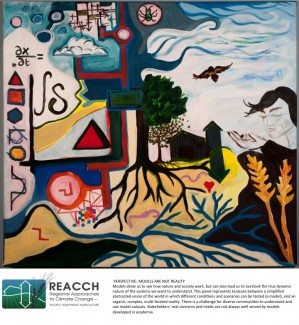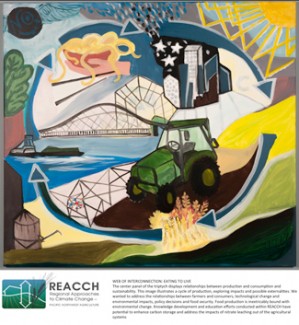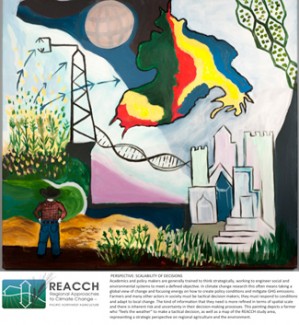Group combines science and art for exhibit about climate change
To many people, art and science seem fundamentally separate, but a group studying climate change in the Northwest intends to challenge the idea.

Jocelyne Helbling | Courtesy
The REACCH PNA tryptych, a three-panel painting, was created last year by REACCH PNA team members. It will be displayed during the organization’s Art and Science Exhibit on March 3.
Regional Approaches to Climate Change for Pacific Northwest Agriculture (REACCH PNA), will host an art and science exhibit March 3. REACCH PNA is accepting climate change-related submissions to display at the exhibit.
“We’re asking for people to submit things if they’re interested in seeing what the collaboration looks like,” said Sanford Eigenbrode, REACCH PNA’s project director. “When I was at Michigan State University a few years ago, they have some effort in their fine arts department to integrate science as a source of inspiration for art, and that’s just an example. You go to the big land grant universities and you can find some deliberate efforts along these lines.”
Eigenbrode said REACCH PNA is an interdisciplinary effort involving 11 teams from three universities who work together in several different fields.
“This isn’t in our proposal to the USDA, we never said we’d have something like this, but we are deliberately and purposefully being transdisciplinary in the project,” he said. “I think there’s a lot of potential for enlarging the community that engage in these issues. There’s quite a bit of public discourse and concern about climate change. It’s on the minds of everyone, not just scientists and farmers. As a result, there’s an opportunity to think more broadly about how we respond as a culture and as individuals to this challenge.”
Jocelyne Helbling became involved with REACCH PNA part-time through another project. She said she and

Jocelyne Helbling | Courtesy
Eigenbrode started talking about the overlap between art and science, which eventually led to creating the exhibit. Helbling said she hopes the exhibit will help people start conversations, specifically about climate change.
“As communities, as a society, we’re starting to face problems that need science and creativity,” she said. “I think there’s a social need to start bringing those together … they really aren’t that separate. You have people like Leonardo Da Vinci that contributed to both all throughout history, and then we started separating them.”
Helbling said the goal of the exhibit is to focus on the theme of climate change. She said REACCH PNA is looking specifically at cereal production and focusing on wheat and barley, which are very common in the region.
“It’s this huge, broad, so scientific … then at the same time, it’s very personal,” she said. “How will farmers in this area respond? Is there a response they need to make? What will happen if we don’t see that?”
Submissions are due by Feb. 15, and anyone is welcome to submit a project.

Jocelyne Helbling | Courtesy
Eigenbrode said a musical piece based on the concept of what REACCH PNA is doing will be played at the exhibit. He said this music is a celebration of the collaboration across the project.
“One of the inputs for Dan was the data from our social network analysis survey of the project as a whole: the generated maps of the way the collaboration looks, and also generated a data set that really characterizes the level of integration between each person in the project and every other person in the project and that somehow turns into a flute score,” Eigenbrode said.
Eigenbrode said REACCH PNA completed a survey of farmers in Pacific Northwest. Although it hasn’t yet been published, he said it contained interesting information about area farmers’ attitudes toward climate change.
“Essentially, there’s an increasing recognition by farmers that climate change is happening,” he said. “But there’s still quite a bit of distrust about whether or not it is driven by human activity, and whether the proper approach is being taken to address that, if it is so. Most of them don’t think that’s the case, by the way.”
Daphne Jackson can be reached at [email protected]

